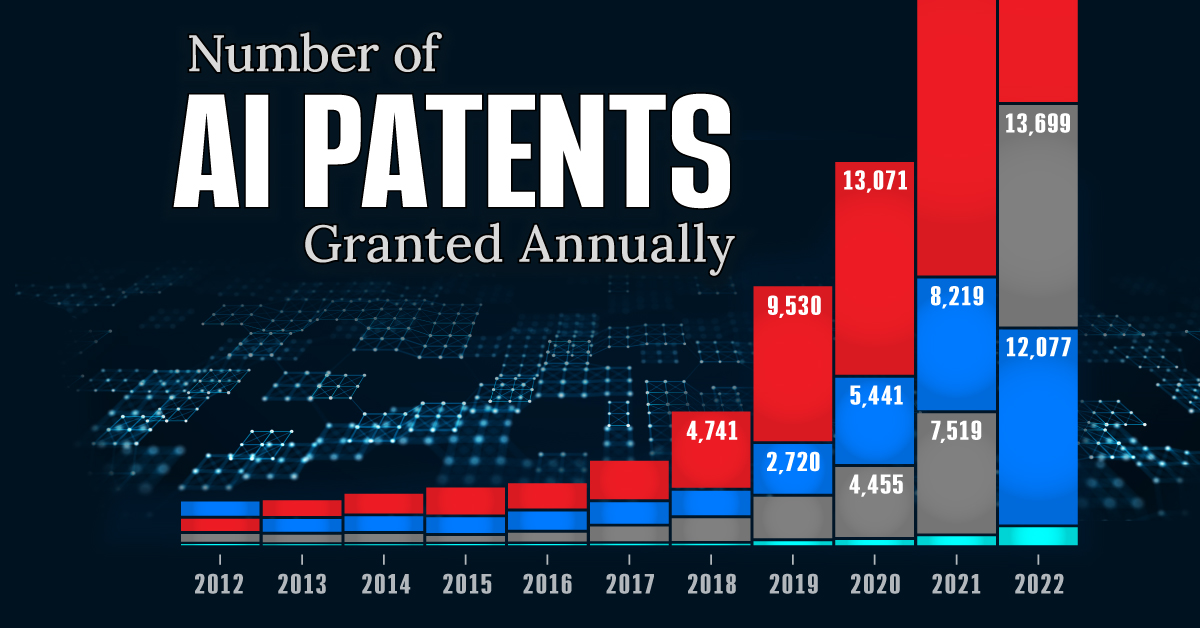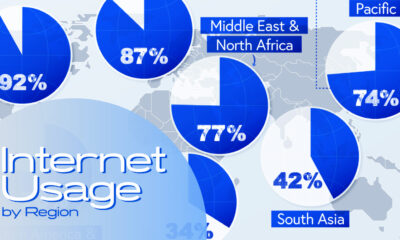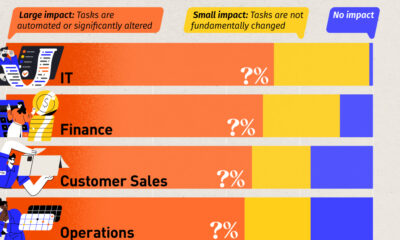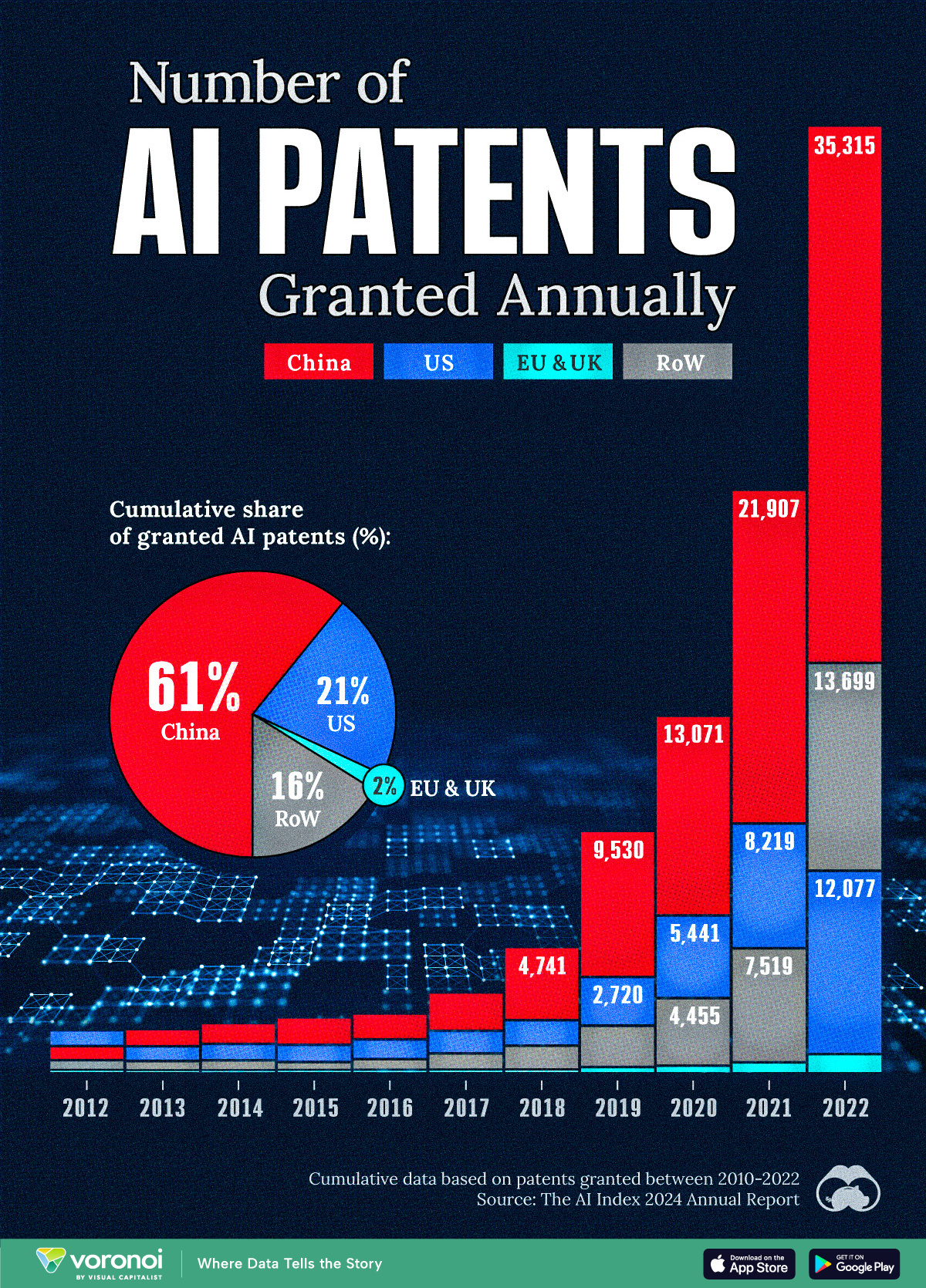Technology
The Skills Needed to Survive the Robot Invasion of the Workplace
Automation is coming to the workplace.
Millions of jobs will be destroyed, but many jobs will also be simultaneously created in the process as well.
For those in the workforce – or for those just joining it for the first time – the big question is: what skills are needed to navigate this monumental shift in the economy? How will humans create value in an increasingly automated world?
The Human Touch
Today’s infographic comes to us from Guthrie Jensen, and it summarizes the skills needed in 2020 and beyond to take advantage of the shifting landscape of work.
In short, for those looking to future proof their careers, building competencies in areas that machines will be unlikely to tackle effectively (i.e. complex problem solving, creativity) is likely the best recipe for success.

It can be daunting to think about automation’s role in the future – but if you’re a bookkeeper, legal secretary, insurance underwriter, credit analyst, or any other person in a job with high automation potential, it would be prudent to be thinking long and hard about what you can offer beyond your existing set of skills and competencies.
Here’s just a quick look at automation potential of select positions, according to a study by Oxford University:
| Position | Chance of Automation | Position | Chance of Automation | |
|---|---|---|---|---|
| Telemarketer | 99% | Physician | 0.4% | |
| Tax Preparer | 99% | Dentist | 0.4% | |
| Insurance Underwriter | 99% | Computer Systems Analyst | 0.7% | |
| Bookkeeping Clerk | 98% | Registered Nurse | 0.9% | |
| Legal Secretary | 98% | Teacher | 1.0% | |
| Credit Analyst | 98% | Microbiologist | 1.2% | |
| Loan Officer | 98% | Pharmacist | 1.2% | |
| Real Estate Broker | 97% | Sales Manager | 1.3% | |
| Payroll Clerk | 97% | Engineer | 1.4% | |
| Accountant | 94% | CEO | 1.5% | |
| Budget Analyst | 94% | PR Manager | 1.5% | |
| Pharmacy Technician | 92% | Architect | 1.8% |
So how do we set ourselves up for future success in a world where even real estate brokers are likely to be automated?
It Starts With Soft Skills
There are many considerations for career success during a time of significant change.
However, there’s a good case that skills – especially soft skills – are the most important foundation to build upon. These include things like the ability to communicate and work well with others, solve problems, and think outside of the box, as well as other aspects of emotional intelligence.
Here are some skills that experts say should be prioritized:
1. Complex Problem Solving
It’s true that AI can solve problems that humans cannot – but it also goes the other way. When problem solving needs to span multiple industries or when problems are not fully defined, humans can work backwards to figure out a solution.
2. Critical Thinking
Machines are getting better at aspects of critical thinking, but humans are still able to to connect, interpret and imagine concepts in a world full of ambiguity and nuance. A lawyer can pinpoint the exact positioning to make a case for a client, or a marketer can figure out an overarching message that can resonate with consumers.
3. Creativity
Creativity requires a degree of intuitive randomness that can not yet be imitated by AI. Why did the architect design the building a certain way, and why did the musician improvise by playing a chord out of key? It’s hard to explain why to a computer – it just feels right.
Other important soft skills to consider?
People management, coordinating with others, decision-making, negotiation, and serving others will all be important going forward as well.
Technology
Visualizing AI Patents by Country
See which countries have been granted the most AI patents each year, from 2012 to 2022.

Visualizing AI Patents by Country
This was originally posted on our Voronoi app. Download the app for free on iOS or Android and discover incredible data-driven charts from a variety of trusted sources.
This infographic shows the number of AI-related patents granted each year from 2010 to 2022 (latest data available). These figures come from the Center for Security and Emerging Technology (CSET), accessed via Stanford University’s 2024 AI Index Report.
From this data, we can see that China first overtook the U.S. in 2013. Since then, the country has seen enormous growth in the number of AI patents granted each year.
| Year | China | EU and UK | U.S. | RoW | Global Total |
|---|---|---|---|---|---|
| 2010 | 307 | 137 | 984 | 571 | 1,999 |
| 2011 | 516 | 129 | 980 | 581 | 2,206 |
| 2012 | 926 | 112 | 950 | 660 | 2,648 |
| 2013 | 1,035 | 91 | 970 | 627 | 2,723 |
| 2014 | 1,278 | 97 | 1,078 | 667 | 3,120 |
| 2015 | 1,721 | 110 | 1,135 | 539 | 3,505 |
| 2016 | 1,621 | 128 | 1,298 | 714 | 3,761 |
| 2017 | 2,428 | 144 | 1,489 | 1,075 | 5,136 |
| 2018 | 4,741 | 155 | 1,674 | 1,574 | 8,144 |
| 2019 | 9,530 | 322 | 3,211 | 2,720 | 15,783 |
| 2020 | 13,071 | 406 | 5,441 | 4,455 | 23,373 |
| 2021 | 21,907 | 623 | 8,219 | 7,519 | 38,268 |
| 2022 | 35,315 | 1,173 | 12,077 | 13,699 | 62,264 |
In 2022, China was granted more patents than every other country combined.
While this suggests that the country is very active in researching the field of artificial intelligence, it doesn’t necessarily mean that China is the farthest in terms of capability.
Key Facts About AI Patents
According to CSET, AI patents relate to mathematical relationships and algorithms, which are considered abstract ideas under patent law. They can also have different meaning, depending on where they are filed.
In the U.S., AI patenting is concentrated amongst large companies including IBM, Microsoft, and Google. On the other hand, AI patenting in China is more distributed across government organizations, universities, and tech firms (e.g. Tencent).
In terms of focus area, China’s patents are typically related to computer vision, a field of AI that enables computers and systems to interpret visual data and inputs. Meanwhile America’s efforts are more evenly distributed across research fields.
Learn More About AI From Visual Capitalist
If you want to see more data visualizations on artificial intelligence, check out this graphic that shows which job departments will be impacted by AI the most.
-

 Markets1 week ago
Markets1 week agoU.S. Debt Interest Payments Reach $1 Trillion
-

 Markets2 weeks ago
Markets2 weeks agoRanked: The Most Valuable Housing Markets in America
-

 Money2 weeks ago
Money2 weeks agoWhich States Have the Highest Minimum Wage in America?
-

 AI2 weeks ago
AI2 weeks agoRanked: Semiconductor Companies by Industry Revenue Share
-

 Markets2 weeks ago
Markets2 weeks agoRanked: The World’s Top Flight Routes, by Revenue
-

 Countries2 weeks ago
Countries2 weeks agoPopulation Projections: The World’s 6 Largest Countries in 2075
-

 Markets2 weeks ago
Markets2 weeks agoThe Top 10 States by Real GDP Growth in 2023
-

 Money2 weeks ago
Money2 weeks agoThe Smallest Gender Wage Gaps in OECD Countries















